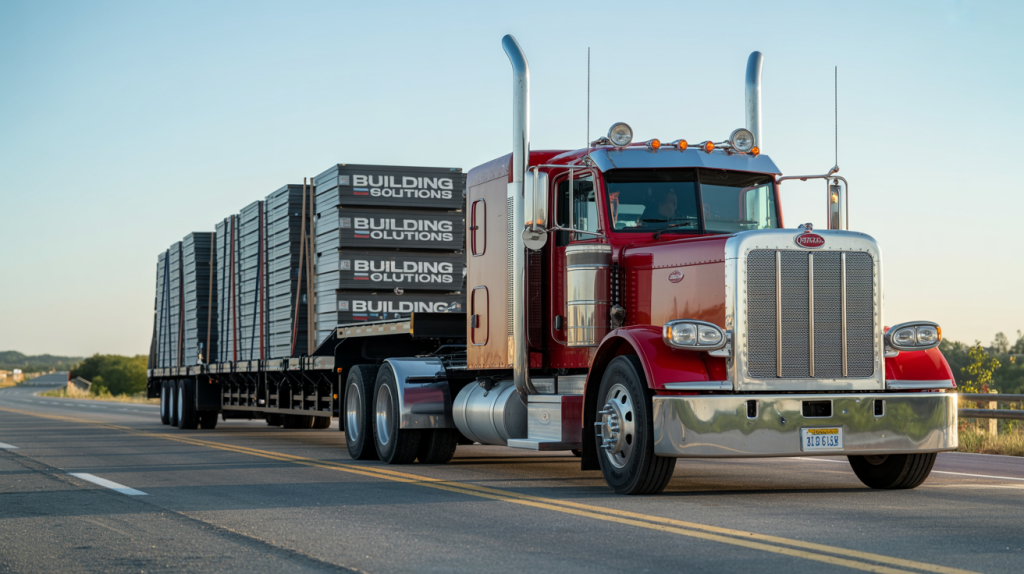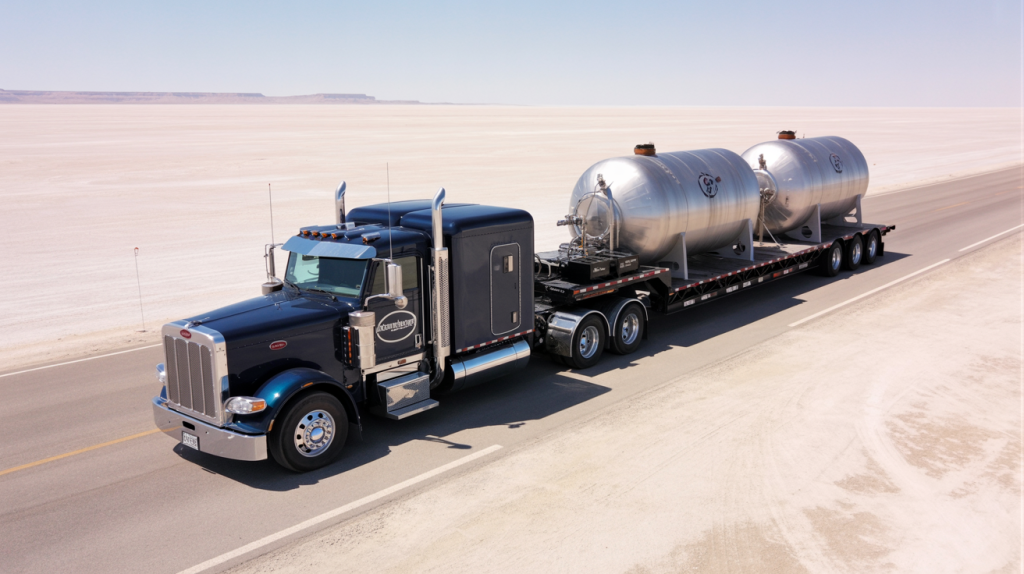How We Avoid Trucking Challenges in North Carolina
Freedom Heavy Haul can offer expedited Pickup and Delivery for any size shipment anywhere in the USA. Contact us today for No Hassle, No Pressure Pricing.
Heavy haul trucking in North Carolina demands careful planning to overcome regulatory, infrastructure, and environmental hurdles. At Freedom Heavy Haul, we manage permits, plan safe routes, and maintain top-tier equipment to ensure your oversized freight arrives on time and intact.
In this article, you will learn about How We Avoid Trucking Challenges in North Carolina.
How We Handle Regulatory Compliance
Verify Legal Dimensions Immediately
We at Freedom Heavy Haul confirm whether your load exceeds 8 ft 6 in, in width, 13 ft 6 in, in height, or 53 ft in length. We also verify if the gross weight is over 80,000 lbs.

Acquire State-Issued Permits Efficiently
We gather all required paperwork well before departure and submit applications through NCDOT’s digital platform to avoid delays. We double-check permit details, dates, routes, and approved hours, to prevent costly fines.
Communicate with Clients
We notify you of any special requirements, such as pilot cars or restricted travel times, and keep you informed of permit status so you can plan accordingly.
How We Overcome Infrastructure Limitations
Reference Infrastructure Clearance Maps
We at Freedom Heavy Haul identify low bridges or weight-restricted structures in advance by consulting NCDOT’s official clearance database before finalizing every route.
Stick to Pre-Approved Heavy Haul Corridors
Whenever possible, we use designated oversize corridors to minimize surprises. If a detour is unavoidable, we have contingency plans to reroute quickly.
Ensure Proper Weight Distribution
We use multi-axle trailers and distribute weight evenly to meet bridge load limits. We perform a load balance check at pickup to prevent trailer sway or tipping.
How We Account for Geographic and Environmental Conditions
Track Weather Patterns
We monitor forecasts for ice, snow, heavy rain, and high winds. In mountainous regions, we schedule runs outside winter months to avoid chain requirements or icy passes.

Use Advanced GPS and Real-Time Data
Our systems integrate live traffic and weather feeds so we can reroute around flooded roads or areas under fog advisory. We adjust driver schedules based on terrain, for example, allowing extra time for steep grades in western counties.
Plan for Seasonal Variability
During hurricane season, we avoid low-lying, flood-prone areas whenever feasible. In summer, we consider heat-related tire pressure risks and schedule more frequent checks.
How We Streamline Permit Acquisition and Routing Strategy
Leverage Digital Platforms
We submit permit applications through NCDOT’s online portal and receive electronic approvals, carrying digital copies to avoid paperwork delays.
Obtain Advance Route Approval
We map out every waypoint, origination, destination, and any edit stops, and get full sign-off before dispatch. We confirm whether escort vehicles are required based on load dimensions.
Schedule During Off-Peak Hours
We often move wide or long loads at night or on weekends to minimize traffic conflicts in metro areas like Charlotte and Raleigh. This reduces the risk of bottlenecks and accelerates transit times.
How We Ensure Safety and Equipment Reliability
Perform Rigorous Inspections
We at Freedom Heavy Haul inspect tires, brakes, axles, and hydraulic systems before every load. We verify that trailers, axles, and tie-downs are rated for your cargo’s exact specifications.
Secure Loads Properly
We use industry-standard ratchet straps and high-strength chains rated for the total weight. We conduct a balance check after loading to confirm even weight distribution and prevent sway.
Maintain Mechanical Reliability
Trailers and tractors undergo scheduled maintenance, with fluid checks and pressure tests logged for every trip. Our mechanics are on call to address any emergency repairs, minimizing downtime.
How We Coordinate with Local and State Authorities
Notify Law Enforcement and Traffic Departments
For loads wider than 12 ft or longer than 75 ft, we arrange state trooper or pilot car escorts as legally required. In Charlotte or Raleigh, we request temporary traffic-signal adjustments at least 72 hours in advance.

Secure Temporary Lane Closures
We submit applications to municipal departments for short-term lane closures during critical maneuvers-like tight turns at delivery sites. We coordinate with local utilities if tree trimming or power-line adjustments are necessary.
Provide Authorities with Complete Route Plans
We share route maps, dimension details, travel windows, and on-site contact information to streamline approvals. This proactive approach avoids last-minute hold-ups at checkpoints.
How We Manage Operational and Financial Pressures
Plan Refueling Strategically
We schedule stops at lower-cost fuel stations outside high-priced metro areas. Drivers follow best practices, minimizing idle time and maintaining steady speeds, to stretch every gallon.
Reserve Staging Areas Early
We reserve large staging spots 1-2 weeks before loading to avoid waiting on the roadside. This ensures we comply with hours-of-service rules and avoid penalties.
Maintain Transparent Communication
We keep you updated on estimated timelines, fuel surcharges, and any unexpected expenses. Our quotes reflect potential infrastructure fees (bridge or tunnel crossings) so there are no surprises.
How You, Our Customer, Contribute to a Smooth Move
Provide Accurate Load Specifications
Double-check the dimensions and weight before pickup. Last-minute changes can require new permits, causing delays. Inform us of any fragile or high-value equipment that needs specialized rigging.
Confirm Delivery Site Access
Ensure there’s adequate turning radius, ground support, and unloading equipment at the destination. Designate an on-site contact who can authorize gate access or direct pilot cars.
Be Available for Rapid Decisions
If a road closure or weather event forces a route change, we at Freedom Heavy Haul will reach out immediately and need your approval to reroute quickly. Agree on acceptable alternative delivery points in case your primary site becomes inaccessible.
FAQ about Trucking Challenges in North Carolina
Here are some questions and answers for How We Avoid Trucking Challenges in North Carolina:
What are the maximum dimensions allowed without a permit in North Carolina?
Loads under 8 ft 6 in in width, 13 ft 6 in in height, 53 ft in length, and 80,000 lbs gross can travel without an oversize/overweight permit. Anything beyond those limits requires a state-issued permit.
How do we find pre-approved heavy haul corridors?
We consult NCDOT’s heavy haul corridor maps and our licensed industry resources. These corridors are routes already vetted for oversize traffic, minimizing surprises.
When are escort vehicles required for oversize loads?
North Carolina law mandates one or more pilot cars for loads wider than 12 ft or longer than 75 ft. We handle all escort coordination so you don’t have to track changing regulations.
What if weather delays the shipment?
We at Freedom Heavy Haul continuously monitor weather feeds. If flooding or icing occurs, we notify you immediately and propose an alternate route or wait-out plan. Our goal is to minimize downtime while maintaining safety.
How far in advance should staging areas be reserved?
Reserve spots at least 1-2 weeks before pickup, especially in Charlotte or Raleigh. That ensures we have safe parking and can comply with hours-of-service rules without waiting on the shoulder.







